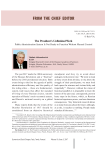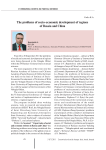Economic and Social Changes: Facts, Trends, Forecast @volnc-esc-en
Статьи журнала - Economic and Social Changes: Facts, Trends, Forecast
Все статьи: 1763
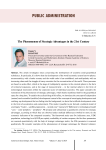
The phenomenon of strategic advantages in the 21st century
Статья научная
The article investigates issues concerning the development of countries amid geopolitical turbulence. In particular, it is shown that the development of the world economic system has two phases: monocentricity, with a leader country and the world order it has established; and multipolarity with an increasing chaos and the struggle of many countries for the reconstruction of the world. These processes are based on scale effect, which at the stage of multipolarity operates in the external sphere in the form of territorial expansion, and at the stage of monocentricity - in the internal sphere in the form of technological innovations within the corporate sector of individual countries. The paper considers the restoration of the phenomenon of strategic advantages, which barely manifested itself in the geopolitical space for a long time. To explain the cyclical rising of this effect, we introduce the concepts of independent (natural) and controlled (artificial) development instead of the concepts of outstripping development and catching-up development that are fading into the background; we show that artificial development exists in the form of acceleration and containment. This made it possible to put forward a political model of sovereignty “leader - satellites/opponents - neutral zone” instead of I. Wallerstein’s technological model “core - semi-periphery - periphery”. We propose and substantiate a quantitative criterion for strategic advantages, according to which they are observed under multiple differences (twofold or more) in the economic indicators of the compared countries. The framework study uses five indicators: area, GDP, population, technology level (GDP per capita), availability of nuclear weapons; the first four parameters are assessed quantitatively with the help of strategic advantages index; the fifth parameter is assessed qualitatively. We consider examples of the phenomenon of strategic advantages for bilateral relations: Azerbaijan/Armenia; Russia/Ukraine; South Korea/North Korea; India/Pakistan, etc. We also reveal the significance of this effect for Russia’s long-term foreign policy strategy.
Бесплатно
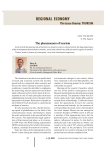
Статья научная
In the article the growing role of tourism in a modern society is characterized, the huge importance of the development of tourism for economic, social and cultural rise of Russia and its regions is marked.
Бесплатно
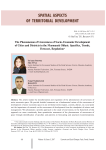
Статья научная
The article studies the transformation and regulation of the phenomenon of unevenness of socio-economic space. We provide detailed comments on a fundamental nature of the unevenness of development of socio-economic space in any territorial entity (region, country, district, etc.) and point out the importance of research on the unevenness of development from the standpoint of science and management. We substantiate a priority approach to the study of unevenness; in the framework of this approach we move consistently from quantitative assessment of the phenomenon of unevenness of space through identification of specifics and patterns to forecasting and practical recommendations for management. All this is related to the prospects of further research. We present the importance and relevance of this study, which aims to identify specifics of the phenomenon of unevenness of socio-economic development of cities and districts of the Murmansk Oblast, and to forecast its dynamics and regulation in present-day crisis conditions...
Бесплатно
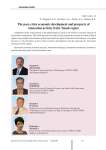
The post-crisis economic development and prospects of innovation activity in the Tomsk region
Статья научная
Completion of the critical phase of the global financial crisis is the need for economic analysis of its possible consequences. The article presents an analysis of key aspects of economic activities of Tomsk region as an example of assessment of the prospects for the region's innovative development. It contains the data on the dynamics of post-crisis economic development and the proposals for innovative orientation of the region.
Бесплатно
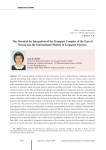
Статья научная
The eastern regions of Russia are the convenient zone in which Russia cooperates with the actively developing Asian region. The key states of North-East Asia such as China, Japan, and the Republic of Korea are the largest participants in world trade at the present stage. The servicing of large-scale commodity flows with the European Union and the U.S. is provided by the market of transport services, by means of which the most effective schemes of delivery are built. Under these conditions, the transport system of the East of Russia has objective prerequisites for integration into the international transport system. The goal of our present study is to assess the potential of integration of the transport system of the Far East in the market of transport services in North-East Asia. At the same time, we assess integration opportunities with the help of dividing the territory of the East of Russia into districts based on the results of cluster analysis. Considering the achievement of the research goal, this approach is a new one. The need for division is due to the fact that the Far East is quite a large region, extremely heterogeneous in its internal composition, economic-geographical and socio-economic characteristics. Constituent entities of the Russian Federation as part of the Far Eastern Federal District have, among other things, different integration potential and level of development of the transport system. In the course of cluster analysis we use indicators of transport network development and the scale of foreign economic activity as the criteria for division. As a result of our calculations, we divide the Far East into five regions that differ in the potential of integration interaction of the transport system with the market of transport services in North-East Asia. The paper presents specific features of the selected areas, characteristics of transport systems and prospects for participation in the international transport market. In the future, it is possible to conduct a study taking into account the projects for development of the transport system of the Far East, which adjust the prospects for integration interactions.
Бесплатно
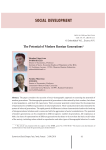
The potential of modern Russian generations
Статья научная
The paper considers the necessity of socio-demographic approach to assessing the potential of modern generations. The demographic potential of generations is determined by their number, their share in total population, and their life expectancy. Their economic potential is determined by the proportion of representatives of different generations in total employment. Their social potential is determined by the system of values of generations. The rapid growth of differences in these characteristics leads to the break up of intergenerational relations and is connected with the aggravation of social contradictions. The potential of modern generations can be considered in different aspects: number of generations, life expectancy at birth, the share of representatives of different generations that share or do not share the basic social values of the society, including values related to reproductive and other types of demographic behavior. In order to identify existing differences between generations in the framework of the socio-demographic approach, the paper analyzes the dynamics of the number of young people in 1926, 1936, 2014 in the Russian Federation; the authors also carry out a comparative analysis of the secondary and authors' sociological data of values-related and reproductive attitudes of conditionally parental and child generations...
Бесплатно
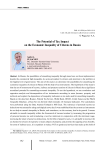
The potential of tax impact on the economic inequality of citizens in Russia
Статья научная
In Russia, the possibilities of smoothing inequality through taxes have not been implemented, despite the consistently high inequality, its acute perception by citizens and attention to the problem at the highest level of government. The aim of the study is to determine the possibilities for smoothing the economic inequality of citizens in Russia with the help of tax instruments. The hypothesis of the study is that the set of instruments of income, indirect and property taxation of citizens in Russia has a significant unrealized potential for smoothing economic inequality. To test the hypothesis, we use correlation and regression analysis and decomposition of tax instruments according to areas (income, property and indirect) and explore the dependence of inequality indicators on tax tools used for smoothing inequality. Based on the data from Rosstat, Federal Tax Service, World Bank, OECD, Credit Suisse and the World Inequality Database, a Data Set was formed which includes 2.6 thousand indicators. The calculations were performed using the Data Analysis Toolpak in MS Excel. The relevance of personal income tax deductions was assessed by using sociological survey dat. It was established that the current tax instruments do not help to smooth inequality in Russia, and sometimes, on the contrary, lead to its growth. It seems advisable to smooth inequality within the framework of income taxation by increasing the progression of personal income tax and introducing a tax-free minimum in conjunction with the minimum wage, increasing the share of social tax deductions. In the field of property taxes, it is advisable to increase the tax burden for owners of expensive or many objects of property, and provide the targeting of tax benefits. In terms of indirect taxes, it is expedient to reduce VAT on goods and services that make up the bulk of consumption expenses of the least well-off citizens, for example, housing and communal services, and to increase VAT on items that form the basis of consumption of the rich, for example, the return of the 20% rate on recreation, hotels, cafes and restaurants. The potential of tax administration in smoothing inequality is determined by the possibilities of ensuring the completeness of taxation of current income, capital and consumption of the most affluent citizens.
Бесплатно
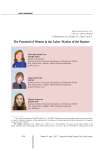
The potential of women in the labor market of the region
Статья научная
Participating in labor activity and the situation on the labor market are among the most important aspects of research into the empowerment of women; this research has a significant impact on the implementation of labor potential, and, consequently, on the overall economic development of the territory. However, as global and Russian practice shows, women in the labor market represent a more vulnerable category than men and often face discrimination in relation to wages, career position, employment, etc. Authors of scientific papers usually acknowledge that female population has higher levels of human capital, but they do not go deep into the analysis of its qualitative characteristics. In this context, we performed a study of the labor potential of women in the regional labor market (on the basis of the monitoring data on the quality status of the labor potential in the Vologda Oblast). Our analysis has shown that the values of the majority of basic components of labor potential quality in women are higher than those in men (with the exception of the health index)...
Бесплатно
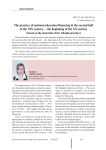
Статья научная
The article deals with the practice of the financing of public education in the Vologda province in the second half of the XIX century - the beginning of the XX century. The article, basing on the historical-comparative approach compares the objects, forms, types and sources of the financing of primary education. The study of the problem is based on the analysis of the archival materials and published record management and statistical documents.
Бесплатно
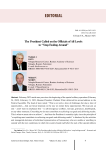
The president called on the officials of all levels to “stop fooling around”
Статья научная
February 2023 marks one year since the beginning of the special military operation (February 24, 2022). February 21, 2023, Russian President Vladimir Putin delivered his annual address to the Federal Assembly. The head of state noted: “This is not only a time of challenges but also a time of opportunities… And our future depends on the way we realize these opportunities. We must put an end - and I want to emphasize this - to all interagency conflicts, red tape, grievances, doublespeak, or any other nonsense. Everything we do must contribute to achieving our goals and delivering results. This is what we must strive to achieve”… And here the President is certainly right, since the principle of “everything must contribute to achieving our goals and delivering results” is hindered by the activities and managerial decisions of individual representatives of bureaucracy who are unable or unwilling to comply with the new conditions in which the country found itself after the start of the special military operation. In the article, we carry on analyzing the situation in Russia, key steps taken by the President in the face of increasing threats to national security, trends in public opinion and individual facts of real life that contradict the dominant national-patriotic trend of social sentiment and the tasks set by the President after February 24, 2022. The information base for our research includes assessments by experts from various fields, results of monitoring sociological surveys, and public speeches of the head of state since 2000. One of our main conclusions is that the future of Russia, the real formation of a new Social Contract, which is possible only after Russia’s victory in the special military operation and which consists in building a sovereign social state based on traditional spiritual and moral values and the principle of social justice, should begin with the mobilization of elites, elimination of “contradictions, formalities and other nonsense”; and the head of state can and should be the initiator of this process.
Бесплатно
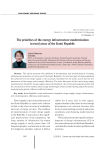
The priorities of the energy infrastructure modernization in rural areas of the Komi Republic
Статья научная
The article presents the problems of development and modernization of energy infrastructure priorities in rural areas of the Komi Republic. For the most part of rural population the achieved level of energy supply is the necessary minimum for the needs, and it has the low parameters of the energy and economy efficiency. The main directions of the rural energy supply modernization should be: the gas supply system development, the electric grid capacity growth and the construction of the modern small energy technologies (small central heating and power plants, modular boiler plants, efficient solid fuel boilers).
Бесплатно
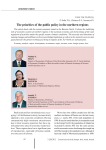
The priorities of the public policy in the northern regions
Статья научная
The article deals with the current economic trends in the Russian North. It shows the stabilizing role of economic systems of northern regions in the national economy and shortcomings of the state regulation of activities under the specific nature-climatic conditions. The necessity and directions of making changes and additions in the tax and budget legislation as well as in the normative acts on state guarantees for the persons working and living in regions of the Far North are substantiated.
Бесплатно
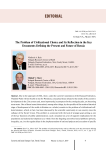
Статья научная
Due to the approach of 2024, when, under the current Constitution of the Russian Federation, Vladimir Putin will not be able to run for President, conceptual issues related to the results of the country's development in the 21st century and, most importantly, its prospects for the coming decades, are becoming more acute. One of these issues (determined, among other things, by the specifics of the modern historical stage of development of the world civilization as a whole) consists in the problem of civilizational self-determination, which, in fact, has been discussed by the scientific community in our country since the collapse of the Soviet Union. This problem is connected with the lack of strategic goal-setting as one of the key functions of public administration; such a situation has a lot of negative implications for the population and national development as a whole: from the lingering unresolved social problems (poverty, inequality, etc.) to the regular delays in the implementation of national projects and execution of specific orders of the head of state. In addition, according to the results of federal and regional studies, Russian society does not have a distinct cultural and value-based vector of development; moreover, against the background of the relentless need to increase the standard of living and achieve social justice, Russian society is increasingly becoming a consumer society with all its key shortcomings such as obsession with the material component of life, the desire to achieve personal success, ignoring the historically established norms of morality, etc. In the context of the issue of civilizational choice becoming more important as well as a wide range of problems caused by its absence, we analyze the Constitution of the Russian Federation and the National Security Strategy of the Russian Federation - the key federal documents that reflect basic principles of the existing dynamics and future prospects of national development. We come to the conclusion that the ruling elites do not work to form the spiritual and moral foundations of Russian society; consequently, the goals they set are focused on solving material problems only, which makes public administration similar to corporate governance. This poses one of the key threats to national security and national development and makes it necessary to hold a broad discussion initiated primarily by the government and aimed to consider practical possibilities and prospects for the implementation of the basic principles of the social state contained in the Constitution of the Russian Federation.
Бесплатно
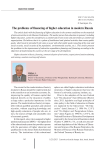
The problems of financing of higher education in modern Russia
Статья научная
The article deals with the financing of higher education in the current conditions on the materials of state universities in the Russian Federation. The author proves that education in general, including higher education, cannot be considered as a commercial service sector and universities as commercial organizations. He believes that it is a sphere of intellectual and spiritual activities that creates public goods, which must be provided by the state on a par with other public goods (ensuring of the state and social security, social security of the population, environmental security, etc.). This article presents the problems in the improvement of education expenditure planning and financing according to the objectives of modernizing the country at the new stage of its development.
Бесплатно
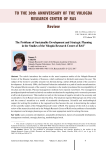
Статья научная
The article introduces the readers to the most important studies of the Vologda Research Center of the Russian Academy of Sciences, which celebrated its thirtieth anniversary this year. The subject of the Center’s scientific research was formed during a rather difficult period of the country’s development. In the early 1990s, the Russian Federation embarked on a path of market transformation. The adopted liberal concept of the country’s transition to the market proclaimed the incompatibility of the plan and the market. Planned management methods were rejected everywhere. The management paradigm adopted was based exclusively on market mechanisms for regulating socio-economic processes at all levels of government. This resulted not only in the increase of negative trends in the economy and social sphere, but in Russia’s descent into the abyss. The situation required finding ways out of the crisis and the country’s transition to a model of sustainable development. Scientific and methodological support for solving this problem at the regional level has become the core in determining the subject of the scientific studies of the Vologda Research Center of RAS. The purpose of the work is to make a review of the research carried out by the Vologda Research Center of RAS on the problems of sustainable development and strategic planning as one of the most appropriate tools for solving this issue.
Бесплатно
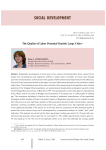
The quality of labor potential outside large cities
Статья научная
Sustainable development of rural areas in the context of reducing labor force caused by the natural loss of population and migration outflow to major cities is possible to ensure only through economic modernization, enhancement of the quality of labor potential and improvement of its efficiency. The goal of the research presented in the paper is to assess labor potential quality in the territories outside major cities. The information base of the work is the data of the monitoring of the qualitative state of labor potential of the Vologda Oblast population, an unprecedented longitudinal sociological research carried out by Vologda Research Center of RAS since 1997. The questionnaire survey takes place in eight districts of the Oblast and in the cities of Vologda and Cherepovets. The sample size is 1,500 people of working age. The assessment technique is based on the concept of qualitative characteristics of the population developed at RAS Institute of Socio-Economic Studies of Population and allows us to evaluate in index form (from zero to one) eight basic qualities of labor potential: physical health, mental health, cognitive potential, creativity, sociability, cultural and moral levels, achievement need...
Бесплатно
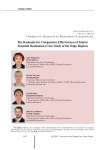
Статья научная
The article presents the analysis of long-term tourism development programs of the Volga Region. Great attention is given to the sector's financing measures set out in development programs. Domestic and foreign tourist potential assessment methods are analyzed. Tourist potential dynamics of the Volga Region is studied based on expert opinion. Using econometric approach the authors study the correlation between tourism investments and incomes of the Volga Region for the past six years - from 2009 to 2014. The analysis was carried out using statistics provided by the Russian Tourism Association and the Federal State Statistics Service of the Russian Federation by category of profitability from paid tourist services and from hospitality and catering services. The conducted analysis helped construct the figures showing the differentiation of the Volga regions by tourism investment efficiency and tourist potential realization. It is shown that tourist potential of the territories and its realization are highly differentiated...
Бесплатно
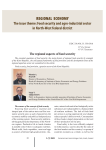
The regional aspects of food security
Статья научная
The essential questions of food security, the main factors of regional food security by example of the Komi Republic, the conceptual frameworks of food provision and the development lines of the regional agrarian sector are considered in the article.
Бесплатно

